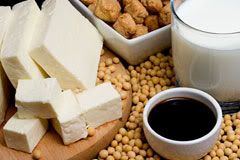
Bone. Will remain strong at a young age to adulthood. However, towards the middle age, the bones will begin to recede. In women, bone loss process going faster and faster after menopause. However, we still could slow the thinning process. One way the best defense is through diet. Eat the right foods can help you achieve the maximum bone mass and increase bone density regardless of your age.
1. Milk
Calcium is the foundation of strong bones. Adults with age under 50 years old need 100 milligrams of milk intake per day and those aged over 50 years require milk intake of 1200 milligrams a day. The main sources of calcium are milk of course. 8 ounces of either skim milk, low fat or regular milk contains 300 milligrams of calcium.
2. Yogurt and cheese
You do not like milk? A cup of yogurt contains the same amount of calcium in 8 ounces of milk. And 1 ounce of cheese is nearly the same amount of calcium. Even if you are allergic to lactose, there is a lot of dairy products with low levels of lactose or lactose-free altogether. Appointment of lactose from milk or milk products will not affect the amount of calcium.
3. Sardine
Milk and milk products are not the only way to get calcium. Sardines are another rich source of calcium. By eating 3 ounces of canned sardines, you will get more calcium than a glass of milk.
4. China Cabbage
Did you know that certain types of vegetables rich in calcium. China half a cup of cabbage contains calcium equivalent to 8 ounces of milk. One cup of turnip greens offers 200 milligrams of calcium. Spinach and broccoli also contain calcium, but you should consume in a number of very much to get equivalent levels of calcium found in milk.
5. Fortified Foods
If you do not like dairy products, sardines and vegetables you could choose fortified foods. These foods are products that basically does not contain calcium, but has been supplemented with various essential nutrients. You can start the day by drinking orange juice that has been equipped with various minerals. This juice contains 240 milligrams of calcium and cereal could contain up to 1000 milligrams of calcium per glass. You can see the label to ensure the right amount.
6. Calcium Supplements
Supplements are an easy way to increase your calcium intake. But some studies show that you do not need to consume them. Of course, if you've got adequate amounts of food. The experts stated that there is no point in consuming more than 1500 milligrams of calcium per day. To maximize the absorption of calcium supplements, is best to eat no more than 500 milligrams at a time.
7. Food from soybean
Half cup of tofu contains 258 milligrams of calcium. However, calcium is not the only mineral that works to strengthen bones. A study showed that plant chemicals known as isoflavone can also increase bone density. And foods such as tofu from soy isoflavone containing many.
8. Salmon
Salmon and other fatty fish contains many nutrients essential for strong bones. These fish contain calcium and vitamin D helps calcium absorption. In addition, salmon is also rich in omega-3. Fish oil supplements have been shown to reduce the decrease in bone mass in women in old age and prevent osteoporosis.
9. Nuts and seeds
Nuts and seeds can strengthen bones in various ways. Almonds, peas, and sunflower seeds are rich in calcium. Walnuts and flaxseed are rich in omega-3. Peanuts and almonds contain potassium which can prevent loss of calcium through the urine. Nuts also contain protein and other nutrients that play an important role in building strong bones.
10. Limit salt
Salt causes the body is calcium deficient. The more salt you eat, the more calcium is lost through urine. Following low-salt diet can petrify you maintain calcium and strong bones.
11. Sunlight
The sun is technically not a food. However, the sun contains many nutrients found in some foods. In response to sunlight, the body will produce vitamin D. Without vitamin D, your body will not absorb calcium properly. Although milk is often fortified with vitamin D, but there are still not enough to maximize calcium absorption.



0 comments:
Post a Comment